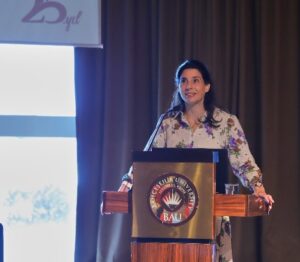On July 19th, 2023, Project Aladdin organized in Istanbul a special seminar on the lessons to be drawn from the Holocaust, and to what extend policymakers, leaders, and civil society as a whole can truly learn from the past. As the last generation of survivors is no longer with us to share their stories, it becomes even more essential to ensure their memory never be forgotten, continuing Project Aladdin’s mission of Holocaust remembrance and education throughout the world.
Abe Radkin, Executive Director of Project Aladdin, animated this seminar that gathered Dr. Leah Pisar, President of Project Aladdin; H.E. Jamal Khokhar, Ambassador of Canada in Turkey; Metin Delevi, Member of the Turkish Delegation at the International Holocaust Remembrance Alliance (IHRA); Yves Kugelmann, Co-Chair of Project Aladdin, Editor-in-chief of Tachles weekly journal and Board Member of Anne Frank Fonds; Lord Wolfson of Tredegar, Member of the House of Lords, former UK Under Secretary of State for Justice.

Dr. Leah Pisar spoke on the responsibility of the children of Holocaust survivors, evoking the important work of her father Samuel Pisar. One of the youngest survivors of the death camps, Samuel Pisar dedicated his life to fighting all forms of discrimination and the concept of natural enemies. Leah Pisar declared that History has taught us that the “human animal is capable of the best and worst, that the unthinkable remains possible”. Abe Radkin encouraged the audience to remember Samuel Pisar, “who went through hell and came out an optimist”, and his extraordinary capacity to hope despite all circumstances
Education was a main point of debate for our speakers, as Mr. Delevi pointed out that a large portion of young people all around the world remain ignorant about the number of victims and the realities of the Holocaust. He therefore underlined how urgent it is to teach the young generation about the History of the Holocaust.
Yves Kugelmann picked up on this point by underlining the rise of Holocaust denial around the world in part due to the difficulties of teaching in the digital age. He went on to explain how difficult it has become for policymakers and teachers to efficiently teach about the Holocaust when faced with rampant disinformation and fake news online. This growing “virus of hate”, as Leah Pisar put it, inevitably leads to increasing violence. Indeed, she demonstrated that the time between speaking hate and taking action has grown shorter and shorter as violence is normalized online.
According to Lord Wolfson, the lesson of the Holocaust is that it can happen anywhere, no matter how developed the country is deemed: vigilance is of therefore of the essence for all citizens and policy-makers. He also pointed out that all peoples that suffer deserve the “dignity of difference”: while common lessons may be drawn, each situation must be treated as unique.
H.E. Jamal Khokhar underlined the importance of remembrance in order to never forget the futility of violence. His Excellency explained that the protection of minorities is the test of a just society, as the tragedy of the Holocaust taught us. By ensuring the respect of all, regardless of their origin or religion, we can truly apply the lessons of the Holocaust, according to Jamal Khokhar.
Abe Radkin wrapped up the discussion by once again highlighting the crucial importance of Holocaust Education in a world marked by rising extremisms and disinformation.
